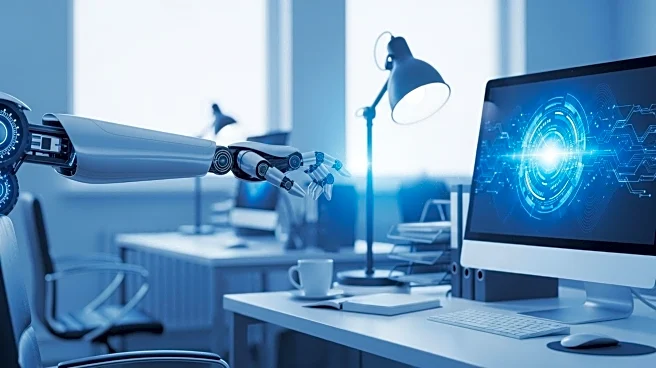What is the story about?
What's Happening?
Walmart CEO Doug McMillon has issued a stark warning about the transformative impact of artificial intelligence (AI) on employment. During a workforce conference at Walmart's Bentonville headquarters, McMillon stated that AI is poised to change every job, reflecting a significant shift in how business leaders view the technology's potential human cost. Companies like Ford, JPMorgan Chase, and Amazon have similarly predicted job losses due to AI, advising employers to prepare their workforces for these changes. Walmart plans to maintain its global workforce size of approximately 2.1 million over the next three years, but the composition of jobs will evolve. The company has already implemented AI-driven chat bots for customers, suppliers, and workers, and is using AI to track supply chain and product trends. Walmart has automated many of its warehouses, leading to job cuts, and is exploring automation for back-of-store tasks.
Why It's Important?
The integration of AI into the workforce is a critical development for U.S. industries, particularly retail. As AI technology advances, it is expected to reshape job roles, potentially leading to job displacement while creating new opportunities. Walmart's approach to maintaining its workforce size while altering job composition highlights the broader trend of companies adapting to AI's impact. This shift could influence public policy regarding employment and retraining programs, as businesses and governments grapple with the need to equip workers with new skills. The potential for AI to replace a significant portion of white-collar jobs underscores the urgency for strategic workforce planning and education reform to mitigate job losses and harness AI's benefits.
What's Next?
Walmart's strategy involves determining how its workforce should adapt to AI advancements, with Chief People Officer Donna Morris and newly hired executive Daniel Danker leading these efforts. The company is likely to focus on retraining employees and hiring individuals proficient in generative AI. As AI continues to evolve, other major retailers and industries may follow suit, investing in workforce transformation initiatives. The broader economic impact will depend on how effectively companies and policymakers address the challenges and opportunities presented by AI, including potential regulatory measures to balance innovation with employment stability.
Beyond the Headlines
The ethical implications of AI-driven job changes are significant, as companies must navigate the balance between technological advancement and workforce displacement. The potential for AI to replace half of all white-collar jobs raises questions about economic inequality and the future of work. Businesses may face legal and cultural challenges as they implement AI solutions, particularly concerning employee rights and job security. Long-term shifts in employment patterns could redefine societal norms around work, necessitating a reevaluation of labor laws and social safety nets.















